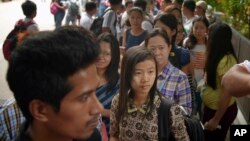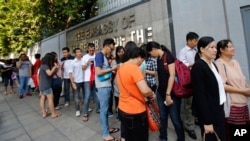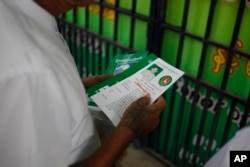Myanmar Embassy officials in Singapore have extended early voting there through at least Wednesday amid criticism of alleged voting manipulation at Myanmar embassies in various countries.
Officials on Sunday had told potential voters in Singapore - some camping overnight on sidewalks - that only the first 3,000 in line would be able to cast ballots. Some 20,000 Myanmar nationals in Singapore had requested to vote in advance of their country's November 8 general election.
Myanmar embassies in various countries, including Singapore and Thailand, have faced a backlash of angry voters complaining about delays and being denied the right to cast ballots.
Thailand is home to an estimated several million Myanmar citizens but less than 700 were deemed eligible to cast ballots – and a number of those faced difficulties when they actually went to the embassy in Bangkok to vote.
“Embassy officials said there are no ballot papers from constituency in Ton Tay township,” explained Aung Myo Kyaw, a migrant worker in Thailand. “I couldn't complain at all. They stopped me. I'm an eligible voter on the early voter list but I'm not allowed to vote.”
Nwe Nwe Win, an engineer training in Bangkok, said she was also on the early voting list but was not allowed to cast ballots.
“I'm very unsatisfied with the results today,” she told VOA.
Similar complaints were listed on social media by early voters who went to embassies in Canberra, Seoul, Tokyo and Washington.
Ambassador admits voting restrictions
Myanmar's ambassador to Thailand, Win Maung, acknowledged “many limitations here” on eligibility for early voting and said he felt “sorry for the Myanmar migrant workers who cannot participate in the election because they don't have time to think about it as they are busy working.”
Only one day was permitted for early voting in Thailand, according to the ambassador, because “there are only between 500 and 600 registered voters here.”
In an online article titled “Reek of corruption at embassy votes” the Eleven Media Group said eligible early voters outside Myanmar “are worried that the missing ballot slips will be filled in fraudulently away from the glare of the electoral observers. This alone might render the election results illegitimate.”
Ruling party apparent beneficiary
Manipulation would be seen as favoring the Union Solidarity and Development Party, headed by President Thein Sein and supported by the powerful military.
Observers note that the USDP needs only to capture about 10 to 15 percent of the available seats in parliament to form a coalition as 25 percent of the legislature is appointed by the military.
The National League for Democracy, the party of opposition leader Aung San Suu Kyi, is expected to make significant gains in the polling. The Nobel Peace Prize laureate, however, is barred by the junta-drafted constitution from becoming president.
Myanmar's national election commission last week briefly considered delaying the election, contending with logistical issues because of recent serious flooding.
The NLD was the only party to raise objection, according to its officials, and the election commission announced balloting would proceed as scheduled.
The NLD secured 80 percent of the legislative seats in the 1990 election, but results were nullified by the military, which refused to hand over power and then put Suu Kyi under house arrest for years.
Zinlat Aung contributed to this report.













